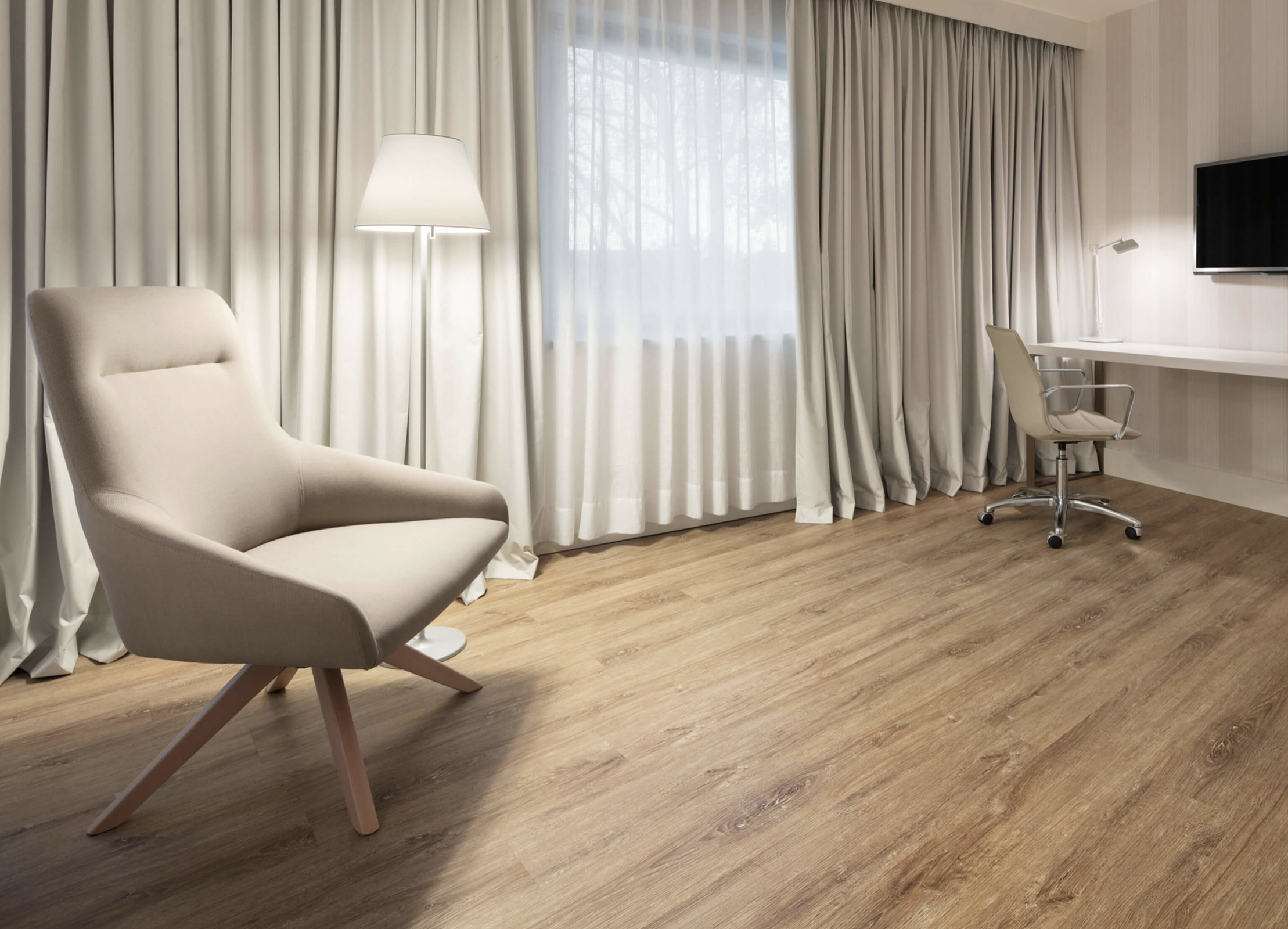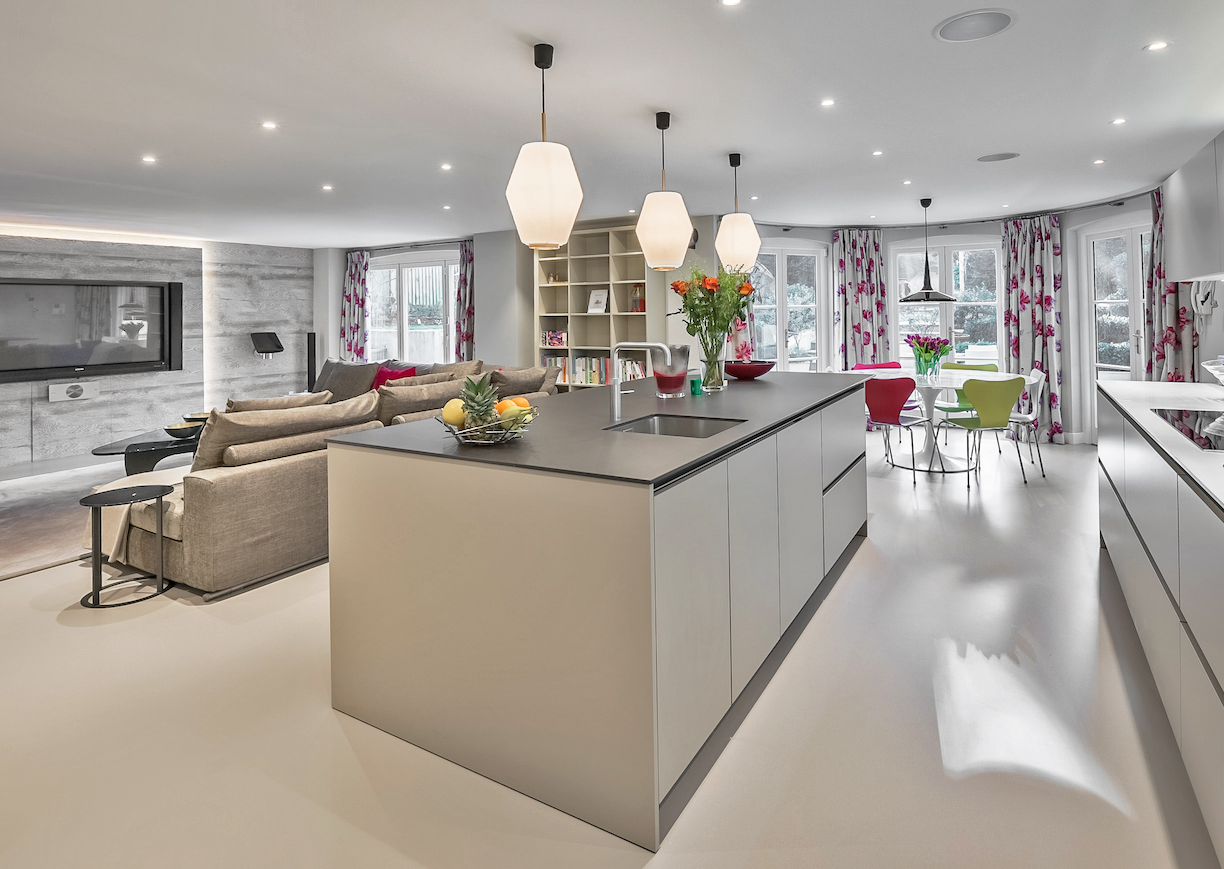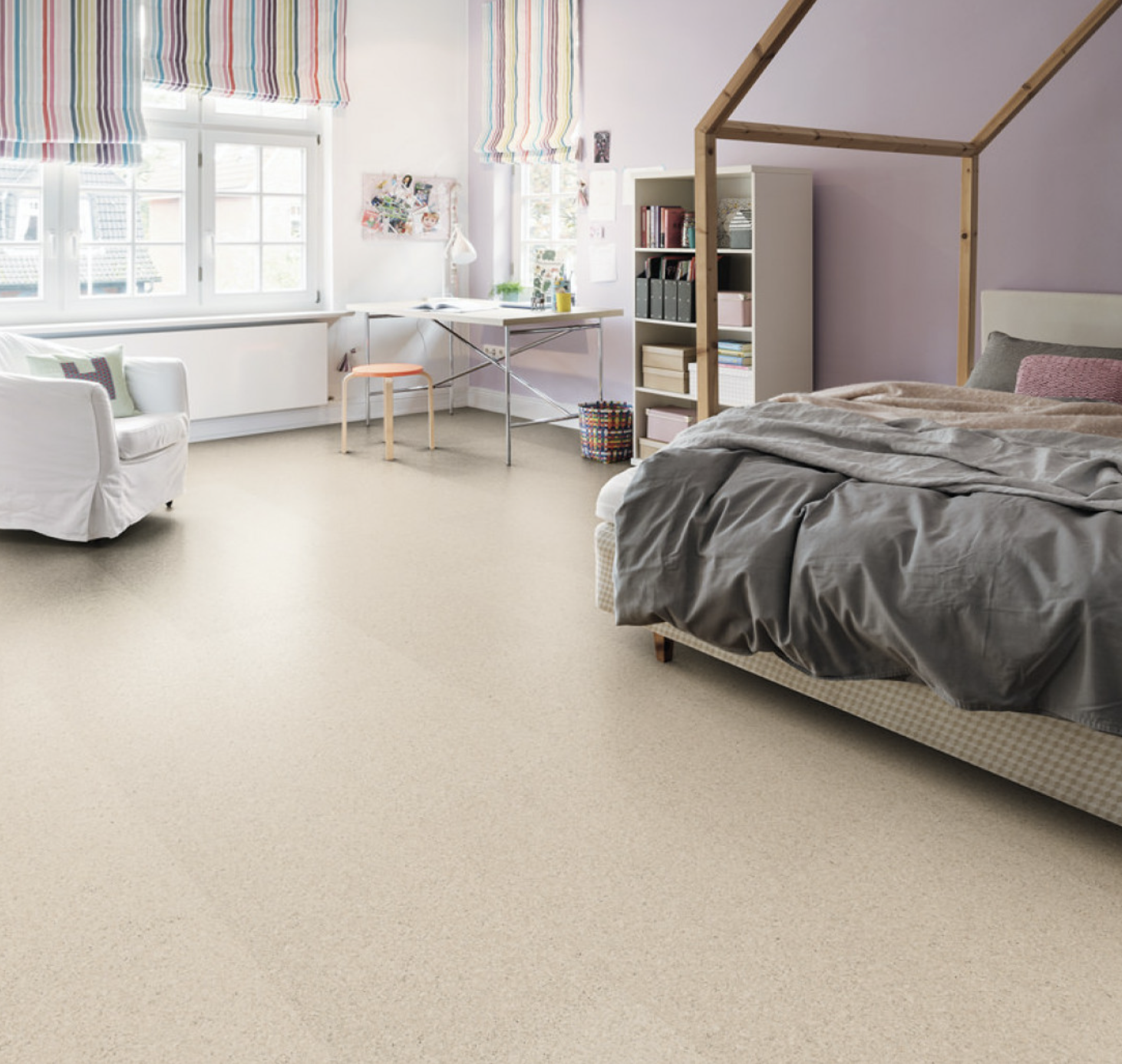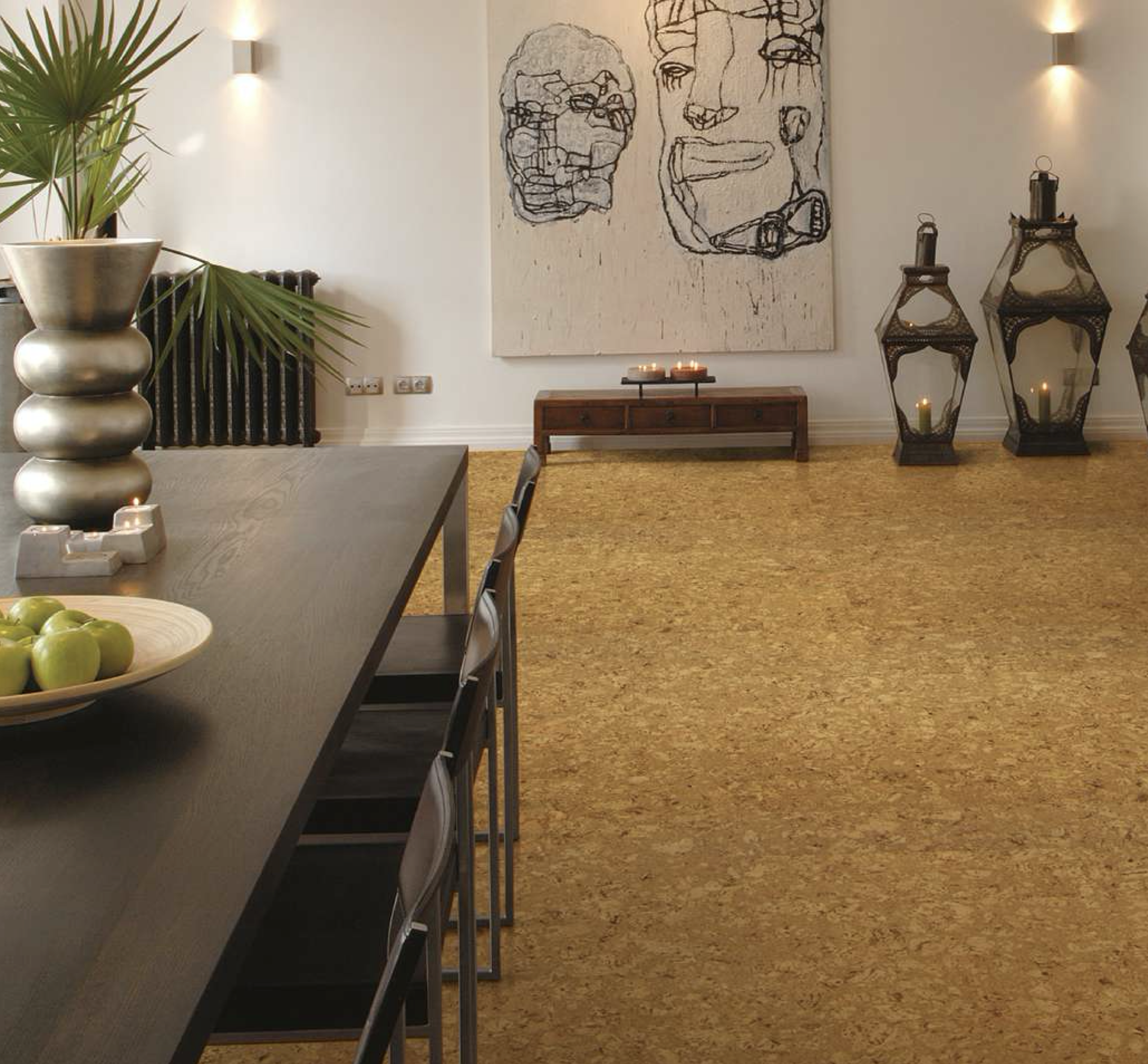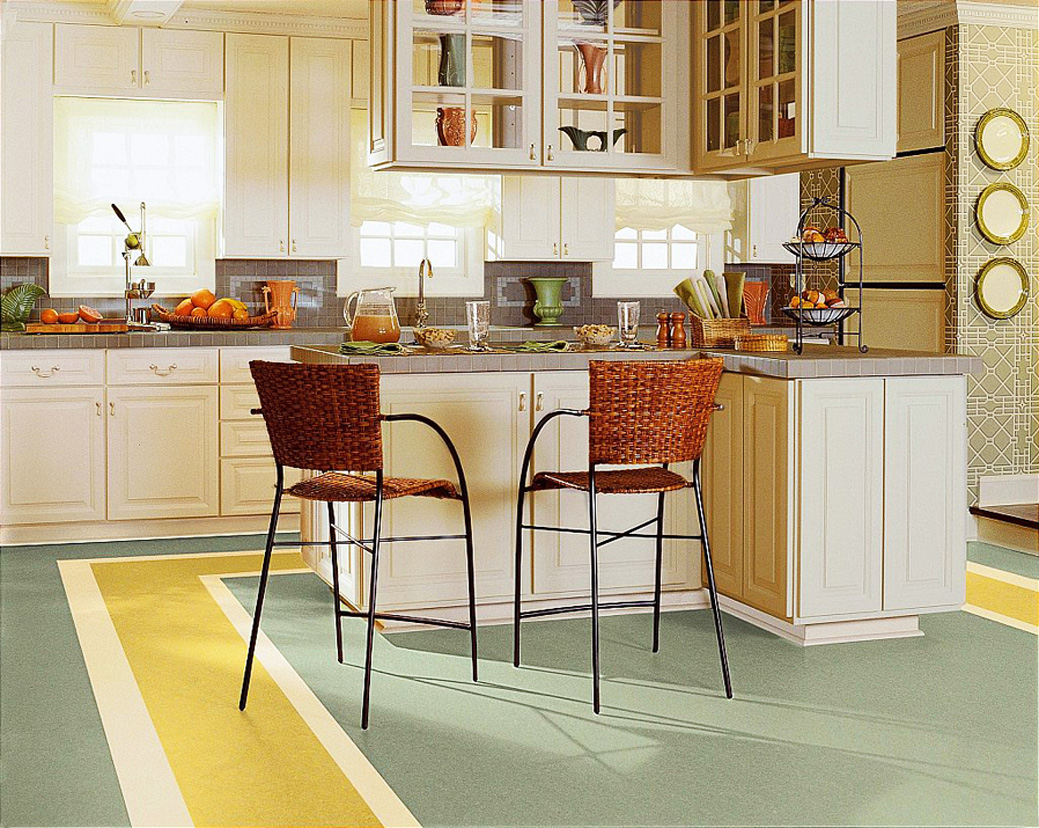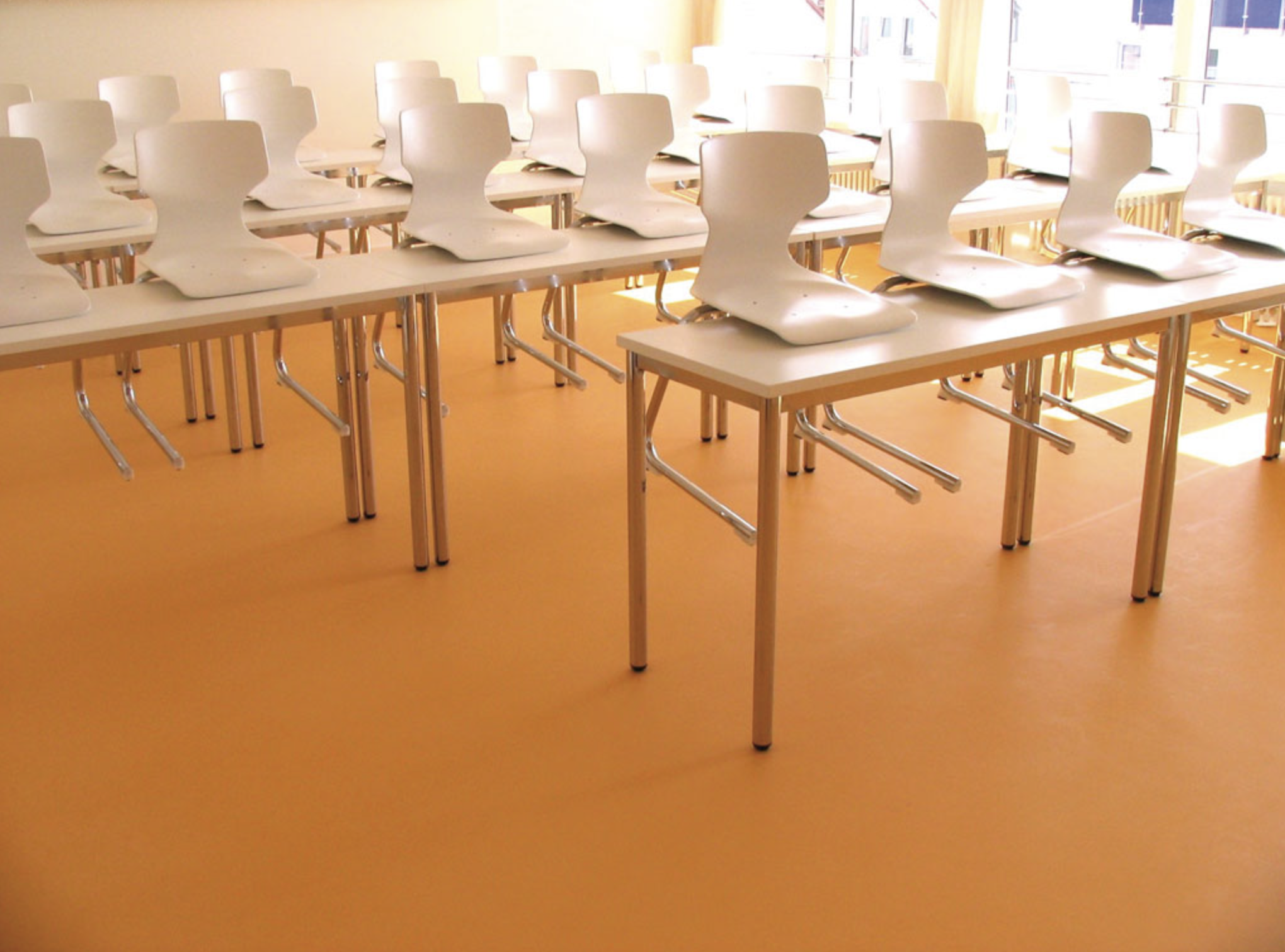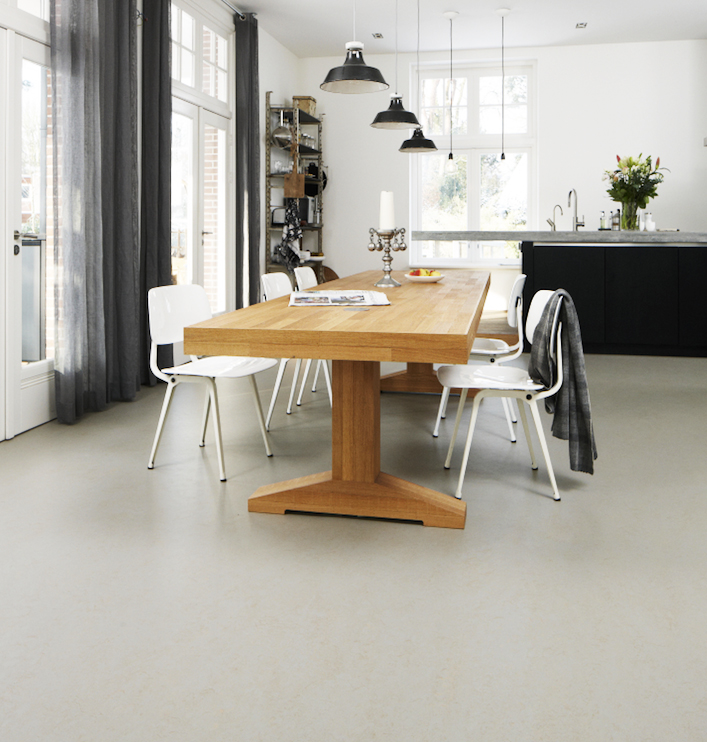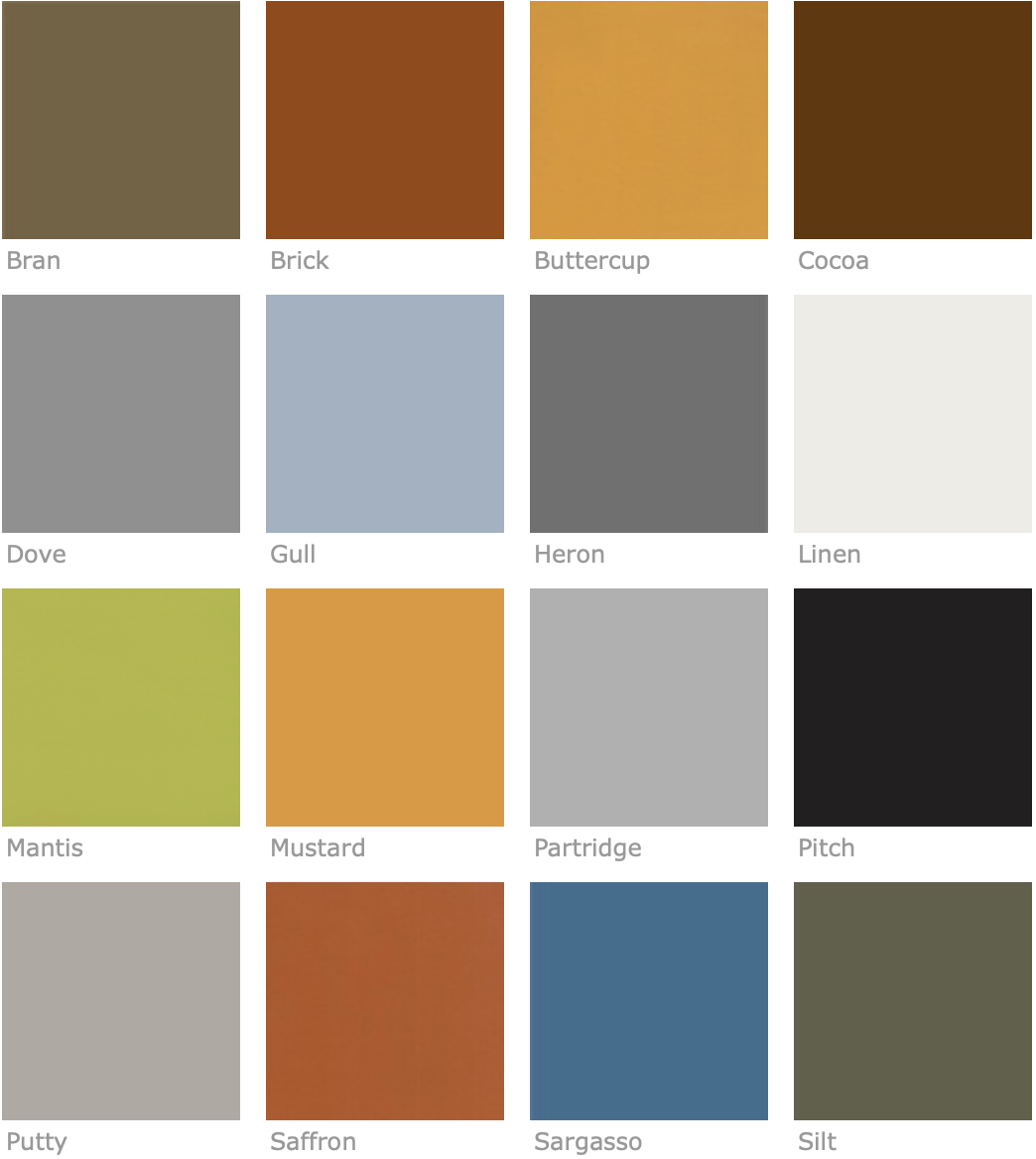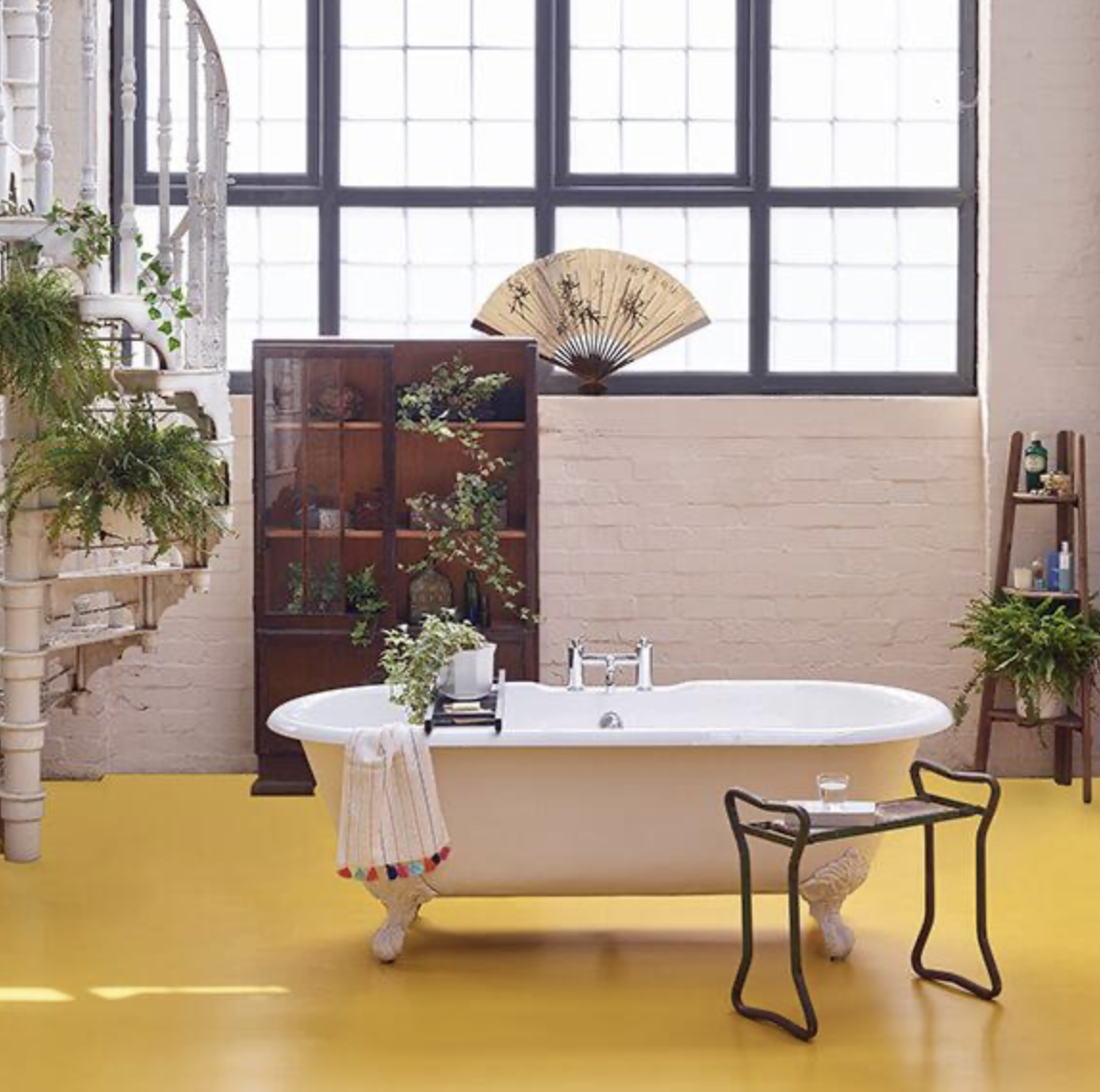Resilient flooring: linoleum, rubber and cork
Continuing her look at resilient flooring, Kay Hill considers the eco merits of linoleum as well as rubber and cork flooring
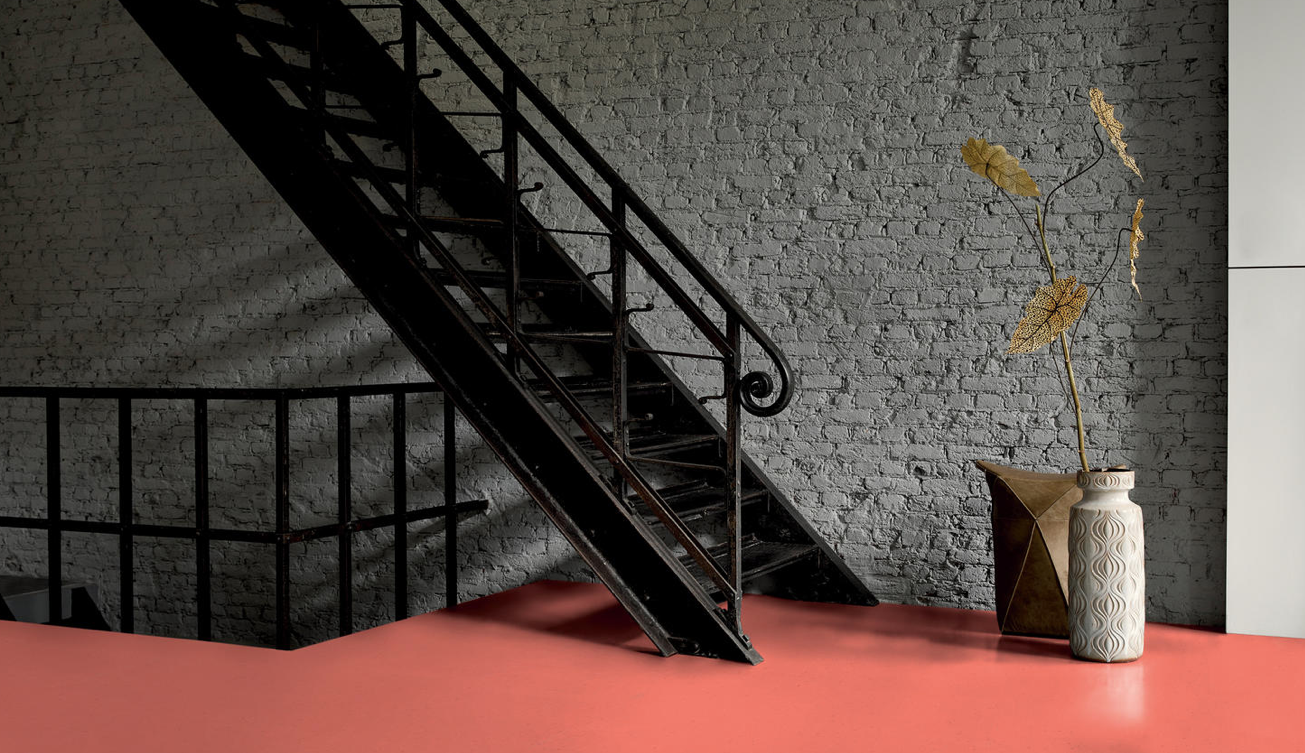
Linoleum is among the is among the eco friendly and hard wearing flooring. It's made from renewable ingredients, principally linseed oil, wood and cork flour and resins, and it comes in a wide range of colours. Expect a good 40 years' wear from it and when the time comes for it to shuffle off its mortal coil, give it a green burial as it's biodegradable. Pictured above: Tarkett's Trentino linoleum is Cradle to Cradle certified
You may sniff at the word 'lino' but don't. While it used to be synonymous with drab and drear interiors, today it comes in tile as well as roll format and can be made into highly stylish, colourful and individual floors. And if you want to be eco in your flooring, well it's one of the most eco-friendly materials.
Linoleum
Linoleum was invented in 1855 by Englishman Frederick Walton, a brush-maker who noticed that a rubbery skin of solidified linseed oil had formed on a can of oil-based paint and postulated that it could be used as a substitute for rubber. Within just 14 years it had become such a popular idea that a judge ruled that his trademark name had become generic, the first time this had occurred, and from then on, lino was open to all.
Until the popularity of vinyl in the 1950s challenged its supremacy, there was hardly a hallway in Britain that didn’t have lino underfoot. Nowadays much of the lino sold is specified for commercial projects, but it's excellent for homes too, although it does need skilled fitting, unlike vinyl which can be a DIY job for the fairly able DIY-er.
Flooring company Urbane Living is a specialist in lino and sells the popular Marmoleum brand, which is made by Forbo.
MD Adam Robertson explains what's great about lino: 'Marmoleum is made primarily from renewable resources, including linseed oil, wood flour, and pine resins. These raw materials are abundantly available and rapidly renewable, with annual crops and grow back schemes. It is one of the most environmentally-friendly flooring materials you can use as it is 100 per cent bio-based and has natural anti-static properties which repel dust and dirt. As such it's easy to clean, reducing exposure to allergens and contributing to better indoor air quality.'
And he praises it for ease of maintenance: 'Its smooth surface means you only require a dry cloth sweeper for dust and a neutral cleaner and damp cloth for any spots, while thanks to the way it is made its beautiful vibrant colours and effects won’t fade or discolour.'
One of the best features of linoleum is that it's homogenous – in other words, it is the same colour all the way through, so no matter how much it scratches or wears it will keep its shade and pattern. And it's so hard-wearing that it can withstand anything up to 40 years' domestic use; but unlike vinyl, which is maintenance-free, lino does need the occasional waxing (...don't we all). It is also unsuitable for bathrooms or other wet environments as it absorbs water which causes excessive expansion and contraction.
Here's how the main producers compare:
Armstrong: The company’s linoleum is made from linseed oil, resins, recycled wood flour, cork dust, limestone and mineral pigments, mounted on jute backing. It is topped with NATURCote, a UV-cured coating that protects the floor from scratches and scuffs and reduces the need for waxing and maintenance, and has a five-year warranty.
Marmoleum: Forbo is the world’s largest producer of lino. Marmoleum is made from 97 per cent natural raw materials, 72 per cent of which are renewable and will grow back within 10 years. It also contains 43 per cent recycled content to reduce the need for virgin raw material, and is 100 per cent biodegradable. It is approved by Allergy UK for its low off-gassing and has a 15-year warranty.
Tarkett: The company makes traditional jute-backed lino, but with a new xf2 surface treatment which protects the floor from wear and avoids the need for re-waxing. Its Trentino lino is made from 94 per cent natural materials such as linseed oil, flax seed, wood and limestone; 73 per cent of which are rapidly renewable, resulting in a low VOC floor with a five-year warranty.
Rubber
If the word rubber conjures up images of sap dripping gently into a bucket under tropical skies, then be warned; the word is used indiscriminately to refer to both natural rubber, petrochemical-based synthetic alternatives, and mixtures of the two. So you need to be especially careful that you know what you are getting.
Synthetic rubber is now more common than natural, and while it is a petrochemical product, it is a by-product of the production of petrol and uses relatively little energy in its manufacture. It is extremely robust and long-lasting and can be recycled. Natural rubber comes from rubber trees in Asia and Africa, making it a fully renewable resource, although it obviously has to be shipped quite a long way. French brand Dalsouple has fabulous real rubber floor tiles in range of good colours, from neutral to brights, priced at around £55 per m2. Dalsouple floors are very appealing: they look smooth, the colour is intense and uniform, and crucially they come pre-sealed so they are very easy to clean, ie simply wipe over with a damp cloth.
Rubber flooring tends to be used more in contract interiors than in the home, but if you want colour and smoothness, then hunt it down as it's great for kitchens and bathrooms. In fact real rubber tiles would be Deco's recommendation for a kitchen floor. You can buy Dalsouple tiles through First Floor Fulham in London.
Look also to the Colour Flooring Company, founded by journalists Bill Tuckey and Lena Corner. They set up the company because they found it impossible to find block-coloured vinyl flooring, but they soon added colourful rubber to their collection and are now the only UK company to supply cut lengths of rubber rather than whole rolls.
'The rubber is homogenous, so it’s the same colour all the way through. It’s slightly more prone to scratching than vinyl, but it will wear down until there’s nothing left while still looking the same colour,' says Tuckey. 'Added to which, it’s a very environmentally-friendly product.'
It’s worth noting that around one per cent of the general population, up to 17 per cent of health workers and as high as 68 per cent of children who have experienced frequent hospitalisation are allergic to latex, which is only present in natural rubber or mixes of rubbers. Natural rubber, and to a lesser extent synthetic rubber, also give off a harmless but strong odour when newly laid.
Natural rubber is slightly less tough than the synthetic substitute and can be more easily damaged by excessive heat, UV light or abrasion. All rubber is susceptible to damage from oil, grease, vegetable fats and strong detergents. Both natural and synthetic rubbers will biodegrade, although synthetic will take many times longer.
The Colour Flooring Company: British firm has its own strongly coloured rubber floors made in European factories with high environmental standards. Floors are made in a mix of natural and synthetic rubber and come in 1.9m widths. Flooring is waterproof and suitable for use with underfloor heating, and has been awarded the prestigious BRE and Blue Angel eco-certifications. colourflooring.co.uk
Harvey Maria: Alongside it’s vinyl tiles, the company also offers a range of plain and textured synthetic mix rubber floors.
Prialpas: Italian company makes a product called Class, which looks like a real leather floor but is made from synthetic vulcanised rubber with a polyeurethane coating. It’s waterproof, fire-resistant and recyclable, available in the UK from Kimpton Flooring. kimptonflooring.co.uk
Cork
Cork flooring, with its natural spring, is one of the oldest types of resilient floor and it's great to see it enjoying a resurgence of late. Its eco-credentials are legion – cork trees live up to 150 years and the bark is stripped around every nine years in a process that doesn’t damage the tree. It has good heat and noise insulation and cork also has anti-bacterial qualities that make it an allergy friendly floor. It is naturally biodegradable.
Wicanders: The firm is part of the giant Portuguese Amorim company which produces 80 per cent of the world’s cork. It tops its cork flooring with a patented Wear Resistant Technology which uses miniscule ceramic beads to protect the floor from wear. Some products boast a 25-year warranty. Wicanders cork floors can also mimic wood and stone. wicanders.com
Resin
Resin floors are poured on site, so are slightly different to resilient floors. But a new product to the UK from Addagrip, called Green Line, may be worth considering. It is made from polyurethane resin which creates a completely seamless finish that feels warm to the touch and can also be used with underfloor heating.
The creators say that the resin is made from a special recipe that keeps carbon emissions to a minimum. 'It’s perfect for bathrooms and kitchens as it’s seamless, spill resistant and very easy to clean – you just give it a swish with a microfibre cloth,' says Karen North-Row, Addagrip’s sales and marketing director. addagrip.co.uk
And Sphere8 is a fairly new-to-the-UK brand that offers poured resin floors, the resin being based on castor oil, a renewable, sustainable crop. These floors are quite time consuming to prepare and fairly expensive but they look smooth and lovely when set and are highly durable.
